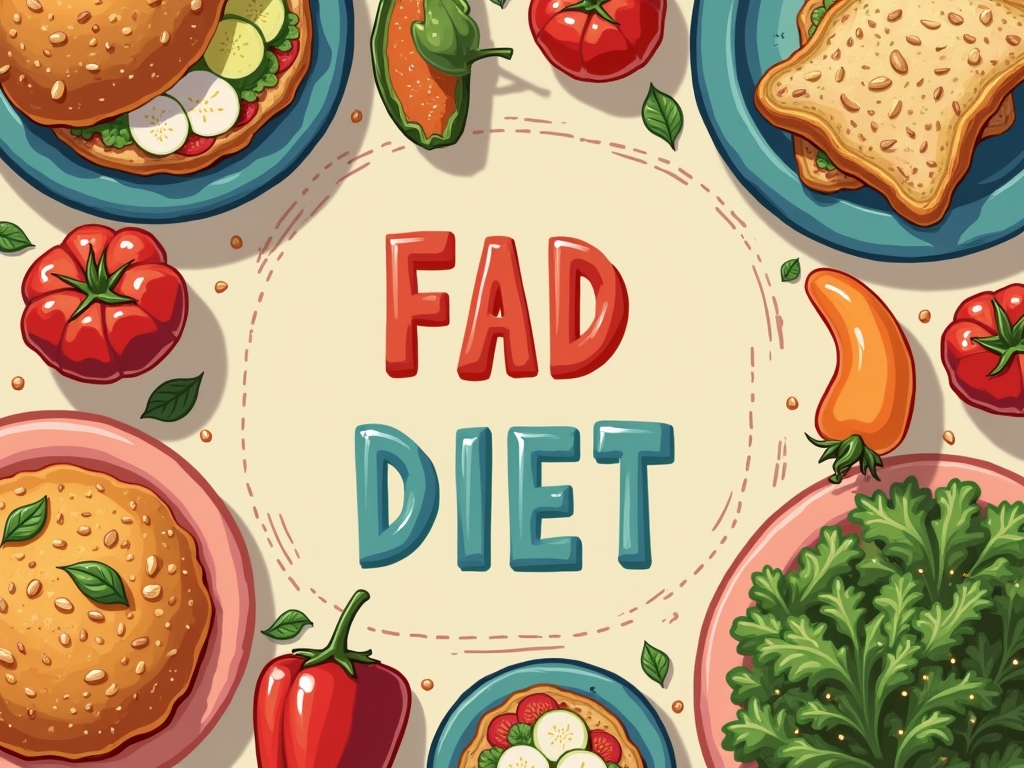Fad diets promoted on TV often captivate audiences with promises of rapid weight loss and dramatic transformation. However, beneath their glossy advertisements are hidden pitfalls that make these diets neither sustainable nor affordable for long-term health. This article explores why such fad diets are problematic by exploring their unsustainable practices, high costs, and the long-term consequences they impose on our physical and financial health.
The Allure of Fad Diets and Their Promises
Television and social media are replete with success stories that promise quick fixes through radical dietary changes. Celebrities and influencers endorse these diets, making them appear as if they are the ultimate shortcut to a better physique. Yet a closer examination reveals that the promises of rapid transformation often evaporate when practical, everyday challenges come into play.
- Instant Gratification: Fad diets promise fast results that appeal to individuals looking to see immediate changes in their weight or health.
- Celebrity Endorsements: The persuasive power of personalities with millions of followers can create a false sense of reliability.
- Simplistic Solutions: Many TV-promoted diets suggest that complex issues like obesity or chronic disease can be resolved with a single dietary change.
- Short-Term Fixes: These diets often do not account for long-term lifestyle adjustments necessary for lasting health improvements.
Example: Consider the “juice cleanse” promoted on several TV shows. They claim to detoxify your body in just seven days. While some dieters might report feeling lighter or more energetic initially, these cleanses often result in muscle loss, nutritional deficits, and rebound weight gain once the diet concludes.

Unsustainability: The Core Problem with Fad Diets
One of the most significant criticisms of fad diets is their unsustainable nature. Many of these diets are designed for short bursts of intense restriction rather than long-lasting, healthy eating habits.
Inherent Challenges of Sustainability
- Extreme Restrictions:
Fad diets often require eliminating essential food groups or drastically reducing caloric intake. When your body is deprived of necessary nutrients, it naturally resists prolonged change.- Nutrient Deficiencies: Removing whole food groups can lead to a deficit of vitamins, minerals, and fibers.
- Physical Fatigue: Extended periods of extreme calorie restriction may leave you feeling drained and unable to perform at your daily capacity.
- Psychological Impact:
The mental stress of following a severely restricted diet can lead to feelings of deprivation and frustration.- Emotional Eating: When the brain perceives a lack of variety and satisfaction, it might trigger cravings for forbidden foods.
- Diet Burnout: Constantly fighting hunger and boredom can result in giving up on the diet entirely.
- Metabolic Adaptations:
When the body is consistently starved of calories, metabolic rates tend to drop as the body enters a conservation mode, making it difficult to lose weight over time.- Plateau Effect: Initial rapid weight loss can quickly plateau as metabolism adjusts.
- Rebound Weight Gain: Once normal eating resumes, the slowed metabolic rate can lead to rapid weight gain.
Real-life Example:
Jessica, a young professional, tried a fad diet that cut out all carbohydrates for 30 days. Initially, she lost 8 pounds thanks to water loss, but soon after, she experienced fatigue, irritability, and severe cravings for simple carbs. After the diet ended, her metabolism had slowed, and she quickly regained the weight along with additional pounds. Jessica’s story is common among those who experiment with extreme diets, which show short-term benefits but fail in the long run.

The Hidden Costs: Why Fad Diets Are Inexpensive Only on the Surface
Many fad diets, while advertised as groundbreaking and transformative, often come with prohibitive hidden costs, rendering them neither truly sustainable nor cost-effective.
Financial Burden of Specialized Diets
- Costly Ingredients:
Many fad diets require expensive, specialty foods that are not found in your regular grocery store. Organic superfoods, specialty supplements, and exotic ingredients quickly add up in cost.- Subscription Services: Some diets even require monthly subscription boxes packed with expensive meal kits or specialty groceries.
- Limited Access: Athletes and dieters living in rural areas may need to order ingredients online, further increasing the cost with shipping fees and higher relative prices.
- High Supplement Expenses:
Fad diets promote the use of supplements—ranging from protein powders to rare herbal extracts—that are critical for the purported benefits.- Nutritional Gaps: Without these supplements, dieters may not attain the promised benefits, necessitating ongoing purchases.
- Quality Variability: The market for supplements is largely unregulated, meaning you could easily end up paying premium prices for products with limited efficacy.
- Dining Out and Social Costs:
Following a fad diet often means avoiding traditional restaurant meals or social gatherings. This avoidance can lead to increased spending on meal preparation or lost opportunities for affordable social dining.- Meal Prep Costs: Buying organic, high-quality ingredients for every meal is generally more expensive than traditional diets that include a wider range of food options.
- Social Isolation: Some individuals might feel forced to dine out less to stick to their diet, potentially impacting their social life and overall well-being.
Real-life Example:
Tom, a 42-year-old father, followed a popular TV diet that required him to purchase fancy organic foods, specialty supplements, and even join an online community for meal plans. Over three months, Tom spent an additional $400 per month on supplements and specialty foods. While his colleagues were eating normal supermarket fare, Tom’s grocery bills skyrocketed. Despite his best intentions, the financial pressure eventually forced him to abandon the diet, underscoring how unsustainable and expensive such plans can be.
Health Implications of Fad Diets
Apart from being unsustainable and costly, fad diets often pose significant risks to health. Their extreme nature may create immediate and long-term health problems.
Nutritional Imbalance
Fad diets frequently eliminate entire food groups which are key to a balanced diet. Essential nutrients, such as vitamins, minerals, and fibers, are often missing from these diets.
- Vitamins and Minerals:
Many fad diets restrict fruits, vegetables, or dairy products, leading to deficiencies in essential vitamins like Vitamin C, D, and calcium. - Fiber Deficiency:
Low-carb or zero-carb diets often lack sufficient fiber, which can impair digestion and inhibit the growth of healthy gut bacteria. - Long-Term Consequences:
Prolonged nutritional imbalances can result in weakened immunity, bone health issues, and even chronic illnesses.
Example:
Consider the vinegar diet that’s been trendy on TV. It suggests consuming only apple cider vinegar and a few selected foods, leading many to miss out on the essential nutrients found in a balanced diet. Over time, dieters may experience digestive issues, a weakened immune system, and other nutrient deficiency-related problems.
Short-Lived Physical Transformations
While many TV fad diets highlight rapid transformations, these changes are rarely maintainable without continuous and drastic dietary adjustments.
- Temporary Weight Loss:
Rapid weight loss is often due to water loss or muscle depletion rather than true fat burning. As soon as normal eating resumes, backsliding into old habits can reverse any progress. - Risk of Disordered Eating:
Extreme dietary restrictions may lead to unhealthy relationships with food or eating disorders, particularly among vulnerable populations.
Example:
Samantha, a college student, opted for a fad diet after watching a series of success stories on TV. Although she dropped 10 pounds in a month, her approach was unsustainable. The severe restrictions led to severe hunger, energy crashes, and eventually, binge eating once the diet was too taxing to maintain. Her experience highlights how unsustainable weight loss can lead to an unhealthy cycle of dieting and overeating.

The Psychological Toll of Fad Diets
Beyond just physical health, extreme dietary practices can have a lasting impact on your mental and emotional well-being.
Emotional and Mental Stress
Maintaining the strict routines demanded by fad diets frequently takes a psychological toll, leading to stress, anxiety, and even depression. The constant pressure to adhere to rigid rules can turn eating from a source of nourishment to a source of tension.
- Obsessive Behavior:
Many dieters become overly preoccupied with tracking every calorie or ingredient, which can interfere with their daily lives. - Social Isolation:
When dining out or participating in social gatherings feels like a minefield of dietary violations, it can lead to feelings of isolation. - Mood Swings:
A lack of balanced nutrition and the associated hormonal imbalances often trigger mood swings and irritability.
Real-life Example:
Mark, an aspiring actor, took on a fad diet to look camera-ready for auditions. Over time, the strict rules led to obsessive calorie counting and constant anxiety about slipping up, which negatively impacted his social life and mental health. Eventually, Mark had to seek counseling to address the stress and anxiety caused by these extreme dietary restrictions.
External Pressure and Unrealistic Expectations
Television programs and social media can create unrealistic expectations, making it seem like achieving the perfect body is simple and quick. This external pressure can have adverse psychological effects on people who fail to attain these results.
- Comparison Culture:
Comparing oneself to the highly controlled images seen on TV can diminish self-esteem and lead to a distorted body image. - Short-Term Success Over Long-Term Wellbeing:
Focusing on rapid transformations rather than sustainable health can cause long-term dissatisfaction.
Example:
Laura, a young professional, was constantly bombarded with images of transformation via fad diets on her favorite TV show. When her efforts did not match the promises, her self-esteem suffered, and she felt trapped in an endless cycle of self-doubt. This case underscores how these diets not only harm physical health but also impose unrealistic standards that can lead to psychological distress.
The Economics of Fad Diets: Breaking Down the Costs
It’s important to examine the real-world financial implications of adhering to fad diets promoted on television. Despite the allure of quick fixes, these diets can strain your finances in multiple ways.
Direct Costs to Consumers
- Premium Food Items:
Many fad diets insist on superfoods and specialized organic ingredients that are significantly more expensive than typical grocery items.- High-End Produce: Organic fruits and vegetables can be two to three times more expensive than conventionally grown options.
- Specialty Proteins: Grass-fed beef, free-range chicken, and wild-caught fish have a higher price tag.
- Supplement Purchases:
To make up for nutritional deficiencies, many fad diets require ongoing purchases of supplements.- Monthly Expenses: Continuous reliance on vitamins, minerals, and detox products can add hundreds of dollars to your monthly budget.
- Quality Concerns: Premium supplements add further cost as consumers try to avoid low-quality alternatives that might not deliver on their promises.
Indirect Costs and Hidden Expenses
- Healthcare Costs:
The long-term health impacts of unsustainable dieting—such as muscle loss, metabolic slowdown, and nutritional deficiencies—can lead to increased healthcare spending.- Doctor Visits: Regular check-ups and treatments for diet-induced complications may be necessary.
- Medications and Therapies: Nutrient imbalances can contribute to chronic conditions that require ongoing medical attention.
- Time and Lifestyle Adjustments:
The time commitment required to adhere strictly to these diets can negatively impact your personal and professional life.- Meal Preparation: Spending extra hours daily to prepare specialized meals can lead to lost productivity.
- Social and Recreational Costs: Avoiding social meals, dining out, and other lifestyle activities further contributes to feelings of isolation and dissatisfaction.
Real-life Example:
Consider Randall, a middle-aged entrepreneur, who invested in a fad diet complete with expensive ingredients and supplements. Over six months, his grocery bills increased by 40%, and the restrictive nature of the diet forced him to decline multiple social invitations. Not only was the diet unsustainable from a health perspective, but the mounting costs also stressed his finances, ultimately contributing to his decision to abandon the diet for a more balanced, budget-friendly approach.

Sustainable Alternatives to Fad Diets
While fad diets might seem enticing due to their fast results, sustainable, balanced eating habits offer lasting benefits for both health and wallet.
Principles of a Sustainable Diet
- Balanced Nutrition:
A sustainable diet prioritizes balance over extremes. It includes a variety of food groups in moderation while ensuring you receive essential nutrients.- Inclusion Over Exclusion: Rather than eliminating entire food groups, focus on portion control and diversity.
- Whole Foods: A diet rich in fruits, vegetables, lean proteins, and whole grains is both nutritious and cost-effective.
- Gradual Lifestyle Changes:
Instead of sudden, radical changes, sustainable eating encourages gradual modifications that can be maintained over time.- Incremental Adjustments: Slowly reducing processed foods while introducing more healthy options creates a lasting impact.
- Flexibility: Allowing occasional treats or deviations can prevent the psychological traps associated with strict dieting and help in maintaining long-term adherence.
- Budget-Friendly Meal Planning:
Healthy eating does not have to break the bank. By planning meals, buying seasonal produce, and exploring budget recipes, you can achieve great nutrition at a lower cost.- Shopping Tips: Look for sales and use local markets to source fresh, affordable produce.
- Meal Prepping: Preparing multiple meals at once reduces costs and minimizes food waste.
Example:
Sarah, a busy mom, adopted a sustainable eating plan after years of jumping between fad diets. By focusing on balanced meals that combined affordable ingredients—like seasonal vegetables, legumes, and lean proteins—Sarah not only improved her family’s health but also significantly reduced grocery bills. Her approach allowed her to enjoy flexibility with occasional treats, leading to a more relaxed and enduring lifestyle change.

Comparing Fad Diets vs. Sustainable Eating
The contrasts between fad diets and sustainable eating are stark. To help illustrate the differences, consider the following comparison table:
| Aspect | Fad Diets | Sustainable Eating |
|---|---|---|
| Approach | Radical restriction and short-term fixes | Balanced, gradual changes |
| Nutritional Balance | Often lacks essential nutrients | Rich in vitamins, minerals, and fibers |
| Cost | High due to specialty ingredients and supplements | Low to moderate; leverages whole, affordable foods |
| Long-Term Viability | Tends to plateau and rebound once relaxed | Promotes lasting health and steady progress |
| Psychological Impact | Can lead to obsessive behaviors and stress | Encourages flexibility and positive body image |
This table underscores how sustainable eating remains a healthier option both financially and mentally.
The Role of Media in Promoting Fad Diets
Television and media play a significant role in the proliferation of fad diets. The sensationalism of quick fixes often overshadows the message of balanced nutrition and long-term wellness.
Media Tactics
- Transformation Stories:
TV shows often feature dramatic before-and-after photos that create unrealistic expectations. These stories focus on short-term outcomes rather than the gradual lifestyle changes required to maintain good health. - Expert Panels vs. Real Science:
Fad diet advertisements might feature so-called “experts” who do not possess the necessary credentials, while credible nutrition advice from professional dietitians is often sidelined. - Product Endorsements:
Many programs include product placements that require dieters to buy supplements or specific food brands. This creates a commercial incentive that has little to do with the scientific validity of the diet itself.
Real-life Example:
A popular TV show once touted a “miracle” diet that claimed to burn fat while you slept. Despite massive hype, follow-up research revealed that the diet relied heavily on expensive supplements and was unable to provide lasting results. Many viewers who attempted to follow the diet ended up spending large sums on products that ultimately failed to deliver sustainable weight loss.
Financial and Lifestyle Implications
Focusing solely on short-term milestones can lead to neglect of broader financial and lifestyle effects. When considering a diet, it is important to factor in the overall cost of healthy living over the long term.
- Cumulative Expense:
The repeated purchase of niche ingredients and supplements adds up over the months and years. - Opportunity Costs:
Money spent on fad diet products could otherwise be invested in more balanced nutrition strategies or even in fitness memberships that support a holistic approach to health. - Stress-Related Expenditures:
The psychological pressure that comes with maintaining an unsustainable diet can lead to additional expenses, such as therapy or stress-relief activities.
Example:
David, an office worker, once tried a TV-promoted low-carb diet that required daily purchases of gourmet organic products. Within a year, he realized that his diet not only failed to produce lasting results but also drained his savings. By shifting to a more balanced meal plan that focused on whole foods available at local markets, David was able to reclaim his finances and achieve more stable long-term health.
Expert Opinions and Scientific Research
The scientific community has repeatedly debunked the viability of diets that promise rapid, radical results. Academics and dietitians agree that sustainable nutrition requires a balanced approach that cannot be achieved through extreme measurements.
Findings from Research
- Metabolic Adaptation:
Research shows that rapid weight loss diets often trigger hormonal changes that slow metabolism, making it difficult to keep the weight off in the long run. - Nutrient Absorption:
Extreme diets can impair the body’s ability to absorb key minerals and vitamins, ultimately undermining immune function and overall wellness. - Behavioral Insights:
Studies reveal that diets based on severe restrictions lead to cycles of deprivation and binge eating, creating more harm than benefit over time.
Example:
A 2019 study in the American Journal of Clinical Nutrition found that participants on a highly restrictive diet experienced significant metabolic slowdown and nutrient deficiencies. In contrast, those who adhered to balanced, sustainable meal plans showed steady weight loss and improved metabolic health over a 12-month period.
Establishing a Long-Term, Affordable Eating Lifestyle
Embracing sustainable eating goes hand in hand with practical meal planning and financial management. Here are some actionable steps to transition from fad diets to a healthier, balanced way of living:
- Start with Education:
Equip yourself with accurate, evidence-based nutrition information. Resources provided by registered dietitians and reputable health organizations offer balanced views on effective diets. - Plan Your Meals:
Develop a weekly meal plan that leverages affordable sources such as seasonal produce, local proteins, and whole grains. This planning not only reduces impulse spending on expensive snacks but also ensures nutritional balance. - Focus on Cooking at Home:
Preparing meals from scratch is a proven way to control your nutritional intake and keep costs down. Experiment with simple recipes that incorporate a variety of food groups. - Set Realistic Goals:
Recognize that healthy weight loss and improved wellbeing are gradual processes. Instead of seeking overnight transformations, aim for steady progress that you can maintain for years to come. - Monitor Health Markers:
Regular check-ups with health professionals can help you stay informed about your progress and address any nutritional deficiencies early.
Example:
Emily, a working mom, transformed her approach to food by prioritizing balanced, home-cooked meals. By buying in bulk, using seasonal vegetables, and following well-researched recipes, she managed to reduce her monthly grocery bill by 25%. Moreover, Emily noticed a sustained improvement in energy levels and weight management without the dramatic ups and downs she experienced with previous fad diets.

Conclusion: Navigating Toward Sustainable, Cost-Effective Nutrition
While fad diets seen on TV offer an enticing vision of quick, effortless transformations, they often come at a steep cost—both financially and physically. Their unsustainable practices can lead to long-term health issues, psychological stress, and a significant drain on your financial resources. In contrast, a balanced, sustainable diet that focuses on whole foods and gradual lifestyle changes is not only more cost-effective but also promotes lasting wellness.
By understanding the pitfalls of fad diets—through examples, scientific insights, and expert opinions—you can make informed choices for a healthier future. Remember, lasting health is built on consistency, balanced nutrition, and realistic expectations, rather than occasional extremes. Your body and wallet deserve more than the fleeting promises of TV-fad diets.
Key Takeaways:
- Fad diets are often built on extreme restrictions that lead to short-lived benefits and long-term health risks.
- The financial burden of specialty ingredients, supplements, and lifestyle disruptions makes these diets unsustainable for most.
- Psychological stress and unrealistic expectations further contribute to the drawbacks of fad diets.
- Sustainable eating, based on balanced nutrition, gradual changes, and budget-friendly practices, offers a more effective path to lasting wellness.
- Educating yourself and planning practical meals can help transition you away from expensive, short-term fixes toward a healthier, cost-effective lifestyle.
By moving away from the allure of quick fixes, you empower yourself to achieve more stable, enduring health. Embrace balanced nutrition, celebrate gradual progress, and invest in long-term well-being. Remember: the most sustainable diet is one that fits into your life seamlessly—not one dictated by a fleeting TV trend.
Adopting sustainable eating habits means recognizing the true value of your health over headline-grabbing promises. In doing so, you not only avoid the pitfalls of fad diets but also gain the benefits of a consistent, balanced approach to nutrition and financial well-being.
Summary:
This extensive article has unpacked the reasons why fad diets promoted on TV are neither sustainable nor inexpensive. By examining real-life examples, scientific research, and the psychological toll, we highlighted the inherent challenges of these diets—including nutritional imbalances, high costs, and long-term health risks. Ultimately, sustainable eating offers a balanced, cost-effective alternative that supports long-term health.
Transitioning to a healthier lifestyle doesn’t have to rely on quick fixes. Instead, it requires thoughtful planning, realistic goals, and a commitment to balanced nutrition. Let the lessons from fad diets guide you away from unsustainable extremes and toward a practical, life-long approach to wellness.
Embrace the journey to lasting health and financial stability by choosing sustainable nutrition that enriches both your body and your lifestyle—because real transformation takes time, balance, and thoughtful choices.

Leave a Reply